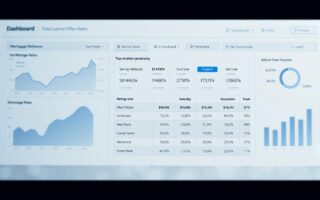“It’s not how much money you make, but how much money you keep, how hard your money works for you, and how many generations you keep it for.” – Robert Kiyosaki. This profound statement underscores the criticality of prudent financial maneuvers, such as refinancing your home loan, to enhance your fiscal well-being.
Embarking on a mortgage refinance can be a shrewd financial strategy, potentially yielding substantial savings in interest payments. It entails the substitution of your current home loan with a novel one, often boasting a reduced interest rate or more advantageous terms.
This discourse aims to elucidate the intricacies of home refinancing, encompassing its benefits and potential drawbacks, thereby empowering you to make an enlightened choice.
Key Takeaways
- Understand the basics of mortgage refinance.
- Learn how refinancing can save you money.
- Discover the different types of refinance options available.
- Find out how to qualify for the best refinance rates.
- Explore the potential pitfalls and how to avoid them.
Understanding Home Loan Refinancing
Refinancing a home loan represents a strategic financial maneuver for homeowners aiming to leverage improved interest rates. This process entails the substitution of an existing mortgage with a new one, often characterized by distinct terms.
What Is a Refinance Home Loan?
A refinance home loan constitutes a novel mortgage that extinguishes the existing loan, enabling homeowners to exploit lower interest rates or modify their loan terms. Such adjustments can yield substantial savings over the loan’s duration.
How Refinancing Works
The refinancing process commences with the application for a new loan, which is employed to settle the outstanding mortgage. Subsequently, homeowners are obligated to fulfill payments on the new loan, ideally under more advantageous terms. It is imperative to seek out multiple lenders to secure the most competitive refinance rates.
Current State of Refinance Rates
Refinance rates are shaped by a multitude of economic variables, including inflation and market dynamics. At present, rates are highly competitive, rendering it an opportune moment for homeowners to contemplate refinancing.
By grasping the fundamentals of home loan refinancing, homeowners are empowered to make well-informed decisions regarding their mortgage. Whether the objective is to diminish monthly outlays or capitalize on home equity, refinancing emerges as a potent financial instrument.
Benefits of Refinancing Your Mortgage
Refinancing your mortgage presents a strategic financial opportunity, offering numerous advantages that can profoundly influence your financial well-being. By re-examining your loan terms, you may potentially reduce expenses, alleviate financial strain, and align with your long-term objectives.
Lower Interest Rates
One of the primary motivations for homeowners to refinance is to capitalize on lower interest rates. Even a minor decrease in interest rates can yield significant savings over the loan’s duration. For example, transitioning a $200,000 mortgage from a 4% to a 3.5% interest rate can result in over $10,000 in interest savings over 10 years. Utilizing a refinance calculator can elucidate the potential savings based on prevailing interest rates.
Reduced Monthly Payments
Refinancing can also facilitate the reduction of monthly mortgage payments, thereby easing the management of household finances. By either extending the loan term or lowering the interest rate, one can achieve more manageable monthly outlays. This is particularly beneficial for homeowners facing difficulties with their current mortgage payments.
Shortening Loan Term
Conversely, some homeowners opt to refinance to shorten their loan term. By transitioning from a 30-year to a 15-year mortgage, for instance, one can expedite loan repayment and diminish total interest paid over the loan’s lifespan. This approach is particularly advantageous for those who have achieved financial stability and can afford increased monthly payments.
Accessing Home Equity
Refinancing also enables homeowners to access their home equity, providing funds for home enhancements, debt consolidation, or other financial necessities. This can be achieved through a cash-out refinance, where the mortgage is refinanced for an amount exceeding the outstanding balance, with the surplus received in cash. It is imperative to meticulously assess your financial standing and objectives before leveraging your home equity.
As
“Refinancing is not a one-size-fits-all solution. It’s crucial to evaluate your financial goals, current interest rates, and loan terms to determine if refinancing is right for you.”
By comprehending the benefits and potential drawbacks, you can make an informed decision that aligns with your financial objectives.
Potential Drawbacks of Home Loan Refinancing
Refinancing a home loan presents a myriad of benefits, yet it is imperative to acknowledge the potential drawbacks. This process is not universally beneficial, necessitating a thorough understanding of its limitations. Such knowledge is crucial for making an informed decision.
Closing Costs and Fees
One of the significant drawbacks of refinancing is the closing costs and fees associated with the process. These can include origination fees, appraisal fees, and title insurance, among others. It is essential to factor these costs into your decision to ensure that refinancing is still a financially viable option.
Extended Loan Terms
Refinancing can sometimes lead to extending the loan term, which may result in paying more interest over the life of the loan. For instance, if you’ve been paying on your current mortgage for five years and refinance to a new 30-year loan, you’ll be extending your loan term.

Potential for Higher Total Interest
Even with a lower interest rate, refinancing to a longer loan term can result in paying more total interest over the life of the loan. It’s a trade-off between lower monthly payments and the total cost of the loan.
Impact on Credit Score
The refinancing process involves a hard credit inquiry, which can temporarily affect your credit score. Additionally, taking on a new loan can impact your credit utilization ratio and the average age of your credit accounts.
To mitigate these drawbacks, it is advisable to shop around for the best refinance lenders and follow expert refinancing tips. By doing so, you can make an informed decision that aligns with your financial goals.
When Should You Refinance Your Home Loan?
Grasping the opportune moment for refinancing your home loan can significantly alleviate financial burdens and enhance your fiscal well-being. Optimal timing for refinancing allows you to leverage lower interest rates, thereby bolstering your financial standing and facilitating the attainment of long-term objectives.
Interest Rate Drops
Homeowners frequently opt for refinancing to capitalize on declining interest rates. Such a move can substantially reduce monthly mortgage outlays. For example, a mere 1% decrease in interest rates on a $200,000 mortgage can yield considerable monthly savings, thereby impacting your financial health positively.
Improved Credit Score
An enhancement in your credit score serves as a compelling reason to consider refinancing. An uptick in your credit score may qualify you for more favorable interest rates, potentially leading to lower monthly payments and cumulative savings over the loan’s duration.
Change in Financial Situation
Alterations in your financial landscape, such as increased income or reduced debt, necessitate a reevaluation of your mortgage. Refinancing can facilitate adjustments to your mortgage payments, ensuring they align with your current financial realities.
Home Value Increase
Significant appreciation in your home’s value presents an opportunity to leverage that equity through refinancing. This can be particularly advantageous for financing home enhancements, settling high-interest debt, or addressing other substantial financial obligations.
| Refinancing Trigger | Potential Benefit | Consideration |
|---|---|---|
| Interest Rate Drops | Lower monthly payments | Closing costs and fees |
| Improved Credit Score | Better interest rates | Credit score impact on approval |
| Change in Financial Situation | Adjusted mortgage payments | Debt-to-income ratio |
| Home Value Increase | Access to home equity | Loan-to-value ratio |
By meticulously weighing these factors against your unique circumstances, you can ascertain whether refinancing your home loan is a prudent decision.
Types of Refinance Home Loan Options
The realm of mortgage refinance encompasses a multitude of options, each meticulously crafted to cater to diverse financial predicaments and aspirations. Homeowners are presented with a spectrum of refinance home loan alternatives, each designed to align with their unique requirements.
Rate-and-Term Refinance
A Rate-and-Term Refinance stands as a quintessential choice within the refinance domain. It encompasses the modification of the interest rate, term, or both, of an existing mortgage, sans the infusion of additional capital. This refinancing variant is particularly advantageous for homeowners desiring to diminish their monthly outlays or transition from an adjustable-rate to a fixed-rate mortgage.
Cash-Out Refinance
Conversely, the Cash-Out Refinance empowers homeowners to refinance their mortgage to an amount exceeding the outstanding balance, thereby procuring the surplus as cash. This strategy is invaluable for those seeking to leverage their home’s equity for renovations, debt repayment, or to address unforeseen financial obligations.
Cash-In Refinance
In contrast, the Cash-In Refinance necessitates the contribution of cash at the closing to decrement the loan balance or to eradicate the mortgage altogether. This approach is beneficial for homeowners aiming to diminish the loan-to-value ratio, eliminate private mortgage insurance (PMI), or secure a more favorable interest rate.
FHA Streamline Refinance
The FHA Streamline Refinance is specifically tailored for homeowners possessing existing FHA loans. It streamlines the refinancing process by curtailing the documentation and underwriting requirements. This option is particularly appealing for those seeking to reduce their monthly payments without the complexities associated with a comprehensive refinance application.
VA Interest Rate Reduction Refinance Loan (IRRRL)
The VA IRRRL is a refinancing option exclusively available to veterans with existing VA loans. It facilitates the refinancing to a lower interest rate with minimal documentation and, in certain instances, without the necessity for an appraisal. This can result in substantial savings on monthly mortgage payments.
Grasping the nuances of these diverse refinance home loan options is crucial for homeowners to make well-informed decisions regarding their mortgage. Whether the objective is to decrease monthly payments, capitalize on home equity, or streamline the refinancing process, there exists a refinance option tailored to various financial objectives and circumstances.
Top Lenders for Home Loan Refinancing
In the realm of home loan refinancing, discerning the most reliable lenders is paramount. This financial maneuver is significant, necessitating the selection of a lender that offers a favorable deal. The decision-making process is complex, influenced by numerous factors.

Quicken Loans/Rocket Mortgage
Overview
Quicken Loans/Rocket Mortgage, a leading online mortgage lender in the United States, is distinguished by its streamlined application process and competitive rates. This institution has garnered a reputation for efficiency and affordability.
Pros
- Fast Application Process: Quicken Loans offers a fully online application process that can be completed in minutes.
- Competitive Rates: They offer competitive interest rates that can help reduce your monthly payments.
- Excellent Customer Service: Quicken Loans is praised for its customer service, making the refinance process smoother.
Cons
- Originating Fees: Some borrowers have reported higher originating fees compared to other lenders.
- Credit Score Requirements: While they offer options for various credit scores, the best rates are reserved for those with excellent credit.
Features
Quicken Loans/Rocket Mortgage offers a range of refinance options, including rate-and-term refinance and cash-out refinance. Their online platform is user-friendly, and they provide a refinance calculator to help borrowers estimate their potential savings.
Recommendations
Quicken Loans/Rocket Mortgage is ideal for borrowers who value speed and a straightforward online application process. It’s recommended to compare their rates with other lenders to ensure you’re getting the best deal.
Bank of America
Overview
Bank of America, a well-established financial institution, offers a variety of home loan refinance products. These products cater to different financial situations, making it a versatile option for borrowers.
Pros
- Existing Customer Benefits: Existing Bank of America customers can enjoy benefits like discounted rates or reduced fees.
- Range of Products: They offer a wide range of refinance products, including fixed-rate and adjustable-rate loans.
- Personalized Service: Bank of America provides personalized service through local branches.
Cons
- Stricter Credit Requirements: Bank of America has stricter credit score requirements for its best rates.
- Potential for Higher Fees: Some customers have reported higher fees compared to other lenders.
Features
Bank of America offers a home loan refinance calculator on their website, helping borrowers to assess their refinance options. They also provide a range of customer support resources.
Recommendations
Bank of America is a good choice for borrowers who are already customers and for those who prefer a more traditional banking experience with the option to visit a branch.
Wells Fargo
Overview
Wells Fargo, another major financial institution, offers comprehensive home loan refinance options. They have a variety of products to suit different needs, making them a versatile choice for borrowers.
Pros
- Variety of Refinance Options: Wells Fargo offers a range of refinance products, including rate-and-term and cash-out refinance.
- Competitive Interest Rates: They offer competitive rates, especially for customers with existing mortgages.
- Extensive Branch Network: Their large branch network allows for in-person consultations.
Cons
- Complex Application Process: Some borrowers find the application process lengthy and complex.
- Customer Service Issues: There have been reports of inconsistent customer service quality.
Features
Wells Fargo provides a detailed online application process and a refinance calculator to help estimate potential savings. They also offer various resources for managing your loan.
Recommendations
Wells Fargo is suitable for borrowers looking for a variety of refinance options and who value the ability to consult with bank representatives in person.
Better.com
Overview
Better.com, a digital mortgage lender, has gained popularity for its fast and transparent home loan refinance process. This institution is known for its efficiency and clarity in financial transactions.
Pros
- Digital Platform: Their fully digital platform allows for a quick and easy application process.
- Transparent Fees: Better.com is known for its transparent fee structure.
- Competitive Rates: They offer competitive interest rates for qualified borrowers.
Cons
- Limited Product Options: Compared to traditional banks, Better.com’s product range is more limited.
- Dependence on Technology: The fully digital process may not be ideal for everyone, especially those who prefer personal interaction.
Features
Better.com offers a streamlined online application and a home loan refinance calculator. Their process is designed to be fast and efficient, with quick approvals.
Recommendations
Better.com is ideal for tech-savvy borrowers who are looking for a quick, straightforward refinance process and are comfortable with a digital-only experience.
The Refinance Process: Step by Step
The refinance of a home loan encompasses a series of pivotal steps, imperative for homeowners to navigate adeptly to facilitate a seamless transaction. Grasping these steps empowers homeowners to make judicious decisions regarding their refinancing endeavors.
Checking Your Credit Score
Initiating the refinance process necessitates an evaluation of one’s credit score. A commendable credit score can unlock access to superior interest rates from the best refinance lenders. Access to credit score evaluations is readily available through numerous online platforms, devoid of cost.
Gathering Financial Documents
Compiling all requisite financial documents is indispensable. This ensemble includes pay stubs, bank statements, and tax returns. Preparation of these documents in advance can expedite the application process.
Shopping for Lenders
Engaging in a comparative analysis of lenders is a critical juncture. It is advisable to scrutinize rates and terms offered by various lenders to identify the most advantageous refinance options for your circumstances.
Application and Approval
Following the selection of a lender, the subsequent step involves the submission of your application. The lender will subsequently assess your creditworthiness and financial documentation, culminating in the approval of your loan.
Closing on Your New Loan
The culmination of the refinance process is the loan closing. This phase entails the execution of the necessary paperwork and the formalization of the terms of your new mortgage. It marks a crucial milestone in the realization of your financial objectives through refinancing.
Tips for Securing the Best Refinance Rates
Attaining the most advantageous refinance rates necessitates a meticulous strategy. Homeowners can substantially reduce their financial outlay by comprehending the determinants of refinance rates and implementing measures to enhance their fiscal standing.
Improve Your Credit Score
An elevated credit score can markedly diminish your refinance rate. Enhancing your credit score entails punctual bill payments, debt reduction, and the avoidance of new credit inquiries. For example, the elimination of a considerable portion of your credit card debt can enhance your score, rendering you a more desirable candidate for lenders.
Lower Your Debt-to-Income Ratio
Lenders perceive borrowers with lower debt-to-income ratios as less risky. To attain this, consider debt elimination or income augmentation. For instance, engaging in a side job or disposing of unwanted items can diminish your debt load, facilitating qualification for superior refinance rates.
Consider Paying Points
Investment in discount points can decrease your interest rate. Although this necessitates an initial expenditure, it can yield long-term financial benefits. For example, a $2,000 expenditure to lower your rate from 4% to 3.75% can result in substantial savings over the loan’s duration.
Shop Multiple Lenders
Comparing offers from diverse lenders can facilitate the identification of the most favorable refinance rate. Engaging in negotiations is advisable; some lenders may be inclined to match or surpass competitors’ rates. This straightforward action can yield savings in the hundreds or thousands.
Time Your Refinance Strategically
Monitor interest rate fluctuations and refinance when rates are at their lowest. Even minor interest rate reductions can significantly influence your monthly payments. For instance, a 0.5% decrease in interest rates can result in substantial monthly savings on a $200,000 mortgage.
Conclusion: Is Refinancing Right for You?
Refinancing your home loan presents a strategic financial opportunity, offering benefits such as lower interest rates and reduced monthly payments. It also provides access to home equity. However, it is imperative to consider the potential drawbacks, including closing costs and the possibility of extending your loan term.
To ascertain if mortgage refinance is appropriate for you, evaluate your current financial standing, credit score, and long-term objectives. If your credit score has improved or interest rates have decreased, refinancing could be advantageous. Additionally, home refinancing is beneficial for tapping into home equity or transitioning from an adjustable-rate to a fixed-rate loan.
The decision to refinance should be grounded in a comprehensive analysis of your financial situation and goals. By meticulously weighing the pros and cons of home refinancing, you can make an informed choice that aligns with your financial aspirations.



